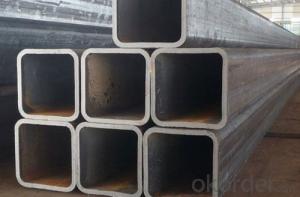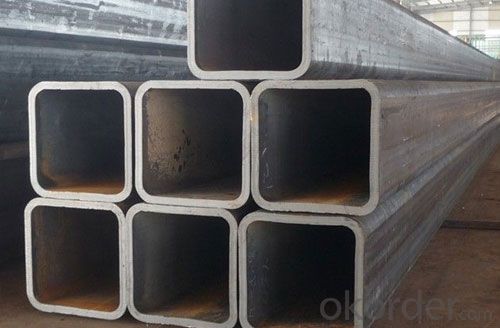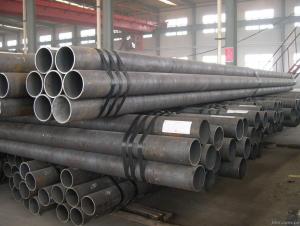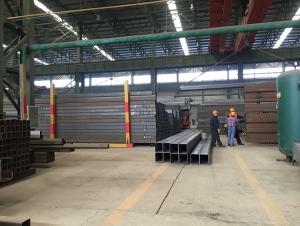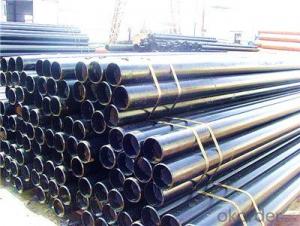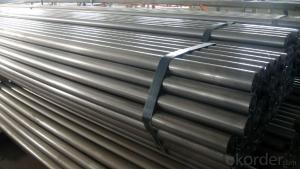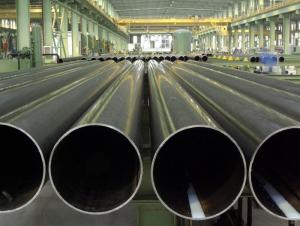High Quality Seamless Rectangle Steel Tubes And Pipes
- Loading Port:
- China Main Port
- Payment Terms:
- TT or LC
- Min Order Qty:
- 25 m.t.
- Supply Capability:
- 8000-10000 m.t./month
OKorder Service Pledge
OKorder Financial Service
You Might Also Like
1、Structure of High Quality Seamless Rectangle Steel Tubes And Pipes:
Seamless pipe is formed by drawing a solid billet over a piercing rod to create the hollow shell. As the manufacturing process does not include any welding, seamless pipes are perceived to be stronger and more reliable. Historically seamless pipe was regarded as withstanding pressure better than other types, and was often more easily available than welded pipe.
2、Main Features of the High Quality Seamless Rectangle Steel Tubes And Pipes:
• High manufacturing accuracy
• High strength
• Small inertia resistance
• Strong heat dissipation ability
• Good visual effect
• Reasonable price
3、High Quality Seamless Rectangle Steel Tubes And Pipes Specification:
Standard | GB, DIN, ASTM ASTM A106-2006, ASTM A53-2007 |
Grade | 10#-45#, 16Mn 10#, 20#, 45#, 16Mn |
Thickness | 8 - 33 mm |
Section Shape | Round |
Outer Diameter | 133 - 219 mm |
Place of Origin | Shandong, China (Mainland) |
Secondary Or Not | Non-secondary |
Application | Hydraulic Pipe |
Technique | Cold Drawn |
Certification | API |
Surface Treatment | factory state or painted black |
Special Pipe | API Pipe |
Alloy Or Not | Non-alloy |
Length | 5-12M |
Outer Diameter | 21.3-610mm |
Grade | 20#, 45#, Q345, API J55, API K55, API L80, API N80, API P110, A53B |
Standard | ASME, ASTM |
1) Material:20#(ASTM A 106/A53 GRB.API5LGRB,GB),45#,16Mn,10#.
2) Specification range:OD:21.3-610mm,WT:6-70mm,length:6-12m or according to the requirement of clients.
3) Excutive standards:GB,ASME API5L.ASTM A 106/A53,Despite of the above standards,we can also supply seamless steel pipe with standard of DIN,JIS,and so on,and also develop new products according to the requirements of our clients!
4) Surface:black lacquered,varnish coating or galvanized.
5) Ends:Beveled or square cut,plastic capped,painted.
6) Packing:bundles wrapped with strong steel strip,seaworthy packing.
4、Packaging & Delivery
Packaging Details: | seaworthy package,bundles wrapped with strong steel strip |
Delivery Detail: | 15-30days after received 30%TT |
5、FAQ of High Quality Seamless Rectangle Steel Tubes And Pipes:
①How is the quality of your products?
Our products are manufactured strictly according to national and internaional standard, and we take a test
on every pipe before delivered out. If you want see our quality certifications and all kinds of testing report, please just ask us for it.
Guaranteed: If products’ quality don’t accord to discription as we give or the promise before you place order, we promise 100% refund.
②How about price?
Yes, we are factory and be able to give you lowest price below market one, and we have a policy that “ for saving time and absolutely honest business attitude, we quote as lowest as possible for any customer, and discount can be given according to quantity”,if you like bargain and factory price is not low enough as you think, just don’t waste your time.Please trust the quotation we would give you, it is professional one.
③Why should you chose us?
Chose happens because of quality, then price, We can give you both.Additionally, we can also offer professional products inquiry, products knowledge train(for agents), smooth goods delivery, exellent customer solution proposals.Our service formula: good quality+good price+good service=customer’s trust
SGS test is available, customer inspection before shipping is welcome, third party inspection is no problem.
6、Seamless Pipe ASTM A106/53 Images:
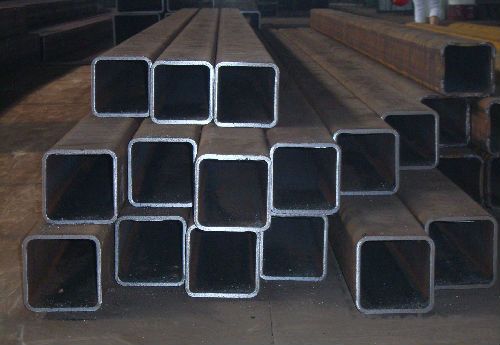
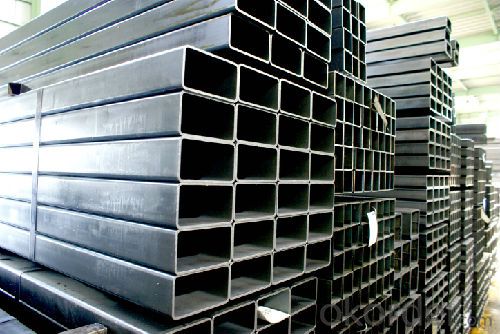
- Q: How are steel pipes used in the automotive manufacturing industry?
- Steel pipes are commonly used in the automotive manufacturing industry for various applications such as exhaust systems, fuel lines, and structural components. They provide durability, strength, and resistance to heat and corrosion, making them ideal for withstanding the harsh conditions of vehicles.
- Q: What are the different methods of coating steel pipes?
- There are several methods of coating steel pipes, including fusion bonded epoxy (FBE) coating, polyethylene (PE) coating, polyurethane (PU) coating, and cement mortar lining. These coatings are applied to protect the steel pipes from corrosion, increase their lifespan, and improve their performance in various applications.
- Q: Are steel pipes suitable for potable water supply?
- Yes, steel pipes are suitable for potable water supply. They are durable, have a long lifespan, and can withstand high pressure. Additionally, steel pipes are resistant to corrosion and provide a reliable and safe option for transporting potable water.
- Q: What are the different types of thread connections used in steel pipes?
- There are several types of thread connections commonly used in steel pipes, including tapered threads such as NPT (National Pipe Taper), which are designed to create a tight seal, and straight threads like NPS (National Pipe Straight), which are often used for mechanical applications. Additionally, some other types of thread connections used in steel pipes include BSP (British Standard Pipe), which is widely used in Europe, and API (American Petroleum Institute) threads, which are commonly used in the oil and gas industry.
- Q: Could you tell me what difference between SC galvanized steel pipe and MT wire pipe?
- Hot galvanized steel pipe galvanized color silver plated SC.MT wire pipe galvanized color silver plated or silver plated cold yellow fever.
- Q: What are the different manufacturing standards for steel pipes?
- Various manufacturing standards for steel pipes are widely recognized and implemented in the industry, ensuring that specific requirements and quality standards are met. Some of the most common standards for steel pipes are as follows: 1. ASTM (American Society for Testing and Materials): Widely used in the United States, ASTM standards encompass a wide range of steel pipe specifications. These standards include specifications for seamless and welded pipes, as well as different grades and dimensions. 2. ISO (International Organization for Standardization): Globally recognized, ISO standards provide guidelines for steel pipe production. They cover areas such as dimensions, materials, testing, and quality control. 3. EN (European Norm): Applicable in Europe, EN standards specify various types of steel pipes. They cover dimensions, materials, manufacturing processes, and testing. 4. JIS (Japanese Industrial Standards): Widely used in Japan and internationally recognized, JIS standards cover dimensions, materials, and testing methods for steel pipes. 5. BS (British Standards): Commonly used in the United Kingdom, BS standards encompass a range of steel pipe specifications. They include requirements for dimensions, materials, and testing procedures. 6. API (American Petroleum Institute): Specifically developed for the oil and gas industry, API standards cover different aspects of steel pipe manufacturing. They include specifications for seamless and welded pipes used in oil and gas exploration, production, and transportation. Manufacturers, buyers, and users of steel pipes should be aware of these standards to ensure the quality, compatibility, and reliability of the pipes. Compliance with these standards helps to ensure that the steel pipes meet necessary requirements and are suitable for their intended applications.
- Q: Are steel pipes suitable for underground sewage lines?
- Yes, steel pipes are suitable for underground sewage lines. They are strong, durable, and resistant to corrosion, making them an excellent choice for sewage systems.
- Q: Are steel pipes more expensive than other types of pipes?
- The cost of steel pipes can vary compared to other pipe types due to various factors. In terms of upfront cost, steel pipes are generally more expensive than certain pipe types. This is primarily because the production process and raw materials for steel pipes are highly costly. Additionally, steel pipes are renowned for their strength and durability, making them a popular option for applications involving high pressure or extreme conditions. However, when considering long-term costs and benefits, steel pipes are often more economically viable. They have a longer lifespan compared to certain pipes, reducing the need for frequent repairs or replacements. Furthermore, steel pipes possess excellent corrosion resistance, making them suitable for diverse environments and reducing maintenance expenses over time. Moreover, the strength and durability of steel pipes contribute to a reduced likelihood of leaks or failures, resulting in significant cost savings to prevent damage or loss. When comparing the cost of steel pipes to other pipe types, it is crucial to consider the specific requirements and characteristics of the project or application. Factors like the transported fluid or material, required pressure rating, expected lifespan, and environmental conditions should all be taken into account. Ultimately, despite steel pipes having a higher upfront cost, their long-term durability and reliability often make them a cost-effective choice in numerous applications.
- Q: How are steel pipes used in plumbing systems?
- Steel pipes are commonly used in plumbing systems for various purposes such as transporting water and gas. They are used to create a network of pipes that carry water from the main supply line to different fixtures like sinks, toilets, and showers. Steel pipes are durable, resistant to corrosion, and have high pressure and temperature tolerance, making them suitable for both residential and commercial plumbing systems.
- Q: Are steel pipes suitable for potable water systems?
- Yes, steel pipes are suitable for potable water systems. Steel pipes are commonly used in potable water systems due to their strength, durability, and resistance to corrosion. They can withstand high pressure and are able to carry large volumes of water. Additionally, steel pipes can be easily welded together, making them a versatile choice for various applications in potable water systems. However, it is important to note that proper maintenance and regular inspections are necessary to prevent any potential issues such as rust or contamination.
Send your message to us
High Quality Seamless Rectangle Steel Tubes And Pipes
- Loading Port:
- China Main Port
- Payment Terms:
- TT or LC
- Min Order Qty:
- 25 m.t.
- Supply Capability:
- 8000-10000 m.t./month
OKorder Service Pledge
OKorder Financial Service
Similar products
Hot products
Hot Searches
Related keywords
